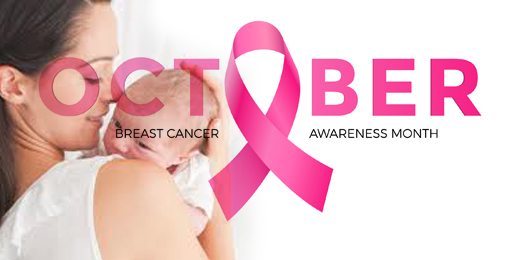
For Breast Cancer Awareness Month,
Spread Awareness of the Abortion Breast Cancer Link
In 1996, Dr. Joel Brind along with colleagues at Penn State Medical College published a meta-analysis of peer-reviewed literature on the connection between induced abortion and subsequent breast cancer. Based on 23 studies, it found a 30 percent higher rate of breast cancer for women with abortion histories. Six years later, in February 2003, the National Cancer Institute officially declared the abortion breast cancer link nonexistent. Clear-thinking people know risk factors are complex and that study results are subject to interpretation, but which is it? Some say the abortion-breast cancer link is real; some say it’s not. Who should we believe? Hold that thought.
When Canadian journalist Punam Kumar Gill first heard about risks associated with abortion, she thought it was all pro-life propaganda. But when she heard that some 40-50 million women worldwide have abortions every year, even as a lifelong pro-choice feminist she thought the sheer numbers called for a closer look into the matter. What if there really were critical health risks following abortion? And what were women being told before consenting to one? Shouldn’t the risks at least be discussed rather than dismissed as anti-abortion strategy?
A Quest for Truth
As a just-the-facts-please kind of journalist, Gill set out to find out the truth for the sake of women’s health. First, she talked to doctors. Dr. David Grimes, an Ob-Gyn and abortionist seemed perturbed at the question: “There are no long-term consequences from abortion, either reproductive or otherwise,” he said rather tersely. “And that includes psychological effects as well.” It’s “an old dog that they keep on flogging,” he continued. There’s a small group of people who hold that view, and their common theme is “religiosity.”
She also consulted Dr. Brind, who emphasized the research findings. Yes, I’m pro-life, he said, but the politics of abortion shouldn’t come into play on this. What should matter is that women have accurate information with which to make an informed choice. That made sense to Gill, as that was what she was after as well.
Next, she visited breast cancer surgeon Dr. Angela Lanfranchi, who, like Brind, has been criticized for going against the medical establishment on this. Lanfranchi started collecting complete reproductive histories on her patients after seeing mention of the link in a textbook, and it’s not about politics for her either: “This is about having fewer patients in my office that are thirty years old with breast cancer,” she said bluntly. She mentioned two patients with “very aggressive breast cancers.” One had had seven pregnancies and five abortions. The other had had five pregnancies and three abortions. “They both died very quickly,” she said.
The Mystery Deepens
Dr. Grimes had emphasized that his opinion was the same as that of all the medical organizations, so Gill looked there next. She contacted the American Cancer Society, the Canadian Cancer Society, the National Cancer Institute (NCI), the World Health Organization (WHO), the American College of Obstetrics and Gynecology (ACOG) and its counterparts in the UK and Canada, RCOG and SOGC. But no one would give her an interview. Not. A. Single. One. The case was closed, they all said, and each referred her to their respective websites.
Now things were starting to feel suspicious. If the jury was in, then why wouldn’t any of them stand behind their position and speak to her?
She kept digging. It turned out, all of their websites referred to an NCI conference that had taken place in 2003. It was then 2016. Had there been no subsequent research into this matter in thirteen years? She travelled to the National Cancer Institute, hoping to persuade someone to talk to her, but upon arrival she was swiftly escorted off the grounds. Things were now approaching scandalous, but she was not one to go away quietly.
She returned to Dr. Brind. As a longtime participant in this debate, he knew some history that wasn’t on the NCI website. At one time, he said, the NCI position accurately reflected the equivocal nature of the debate. Some studies showed a link; some didn’t, and the NCI forthrightly informed the public about the discrepancies and ongoing investigations. That changed in 2001 after Dr. Andrew von Eschenbach came on as NCI director. Soon after his arrival, Brind explained, a letter had arrived on his desk for him to sign. The letter had been signed by twenty-eight congressmembers, and it requested that the NCI website be updated to say that there was no link between abortion and breast cancer, as this was what the congressmembers understood to be accurate scientifically.
Just pause a moment, and let that sink in. If what Dr. Brind said is true, then we have a situation in America where congressmembers requested that a particular medical opinion be issued as the official, government-endorsed position on a risk factor for a terminal disease. And the head of the medical organization complied with the request.
Much could be said about this, but at the very least, those who want more government involvement in health care might want to reconsider their faith in government.
And the Mystery Remains
Back to 2016: Gill was on a mission, now. She found a recording of the 2003 conference and went through it frame by frame. Several things were odd about it. Here are just three: First, in his introduction, Dr. von Eschenbach told attendees that the abortion- breast cancer question was not the topic or purpose of the conference, but it was the reason they were there. Second, in spite of the assertion that some one hundred experts had been cited as declaring the case closed, only a small handful of them were scientists who had actually done research directly related to the subject. Third, only one of them presented–Dr. Leslie Bernstein, Ph.D., a professor of preventive medicine at the University of Southern California. She was given twenty minutes, and she said the data showed no connection.
So that was it. Before February 2003, the data was inconclusive. After February 2003, the matter was settled. There were contradictory findings… until there were not. Make of it what you will, and choose for yourself who you’re going to believe. Gill documented all of this and more in her excellent 2016 film Hush: Start a Healthy Conversation, which she characterizes as pro-information and pro-women’s health.
And the Beat Goes On
Dr. Brind recently reported on meta-analyses from China (2013) and South Asia (2018), that found heightened post-abortion breast cancer rates ranging from 44 percent to 151 percent. Meanwhile, Western public health organizations–the NCI, the American Cancer Society, ACOG, RCOG, the Canadian Cancer Society, WHO, and Susan G. Komen (that one is especially perverse, given that it’s specifically about breast cancer)–continue to maintain, based on 2003 “information,” that there is no link between abortion and breast cancer. Well, and Planned Parenthood, of course, that bastion of medical ethics and women’s health.
For the rest of us though, October has been designated as “Breast Cancer Awareness” month. What better time than now to become informed, promote women’s health, and engage in a healthier conversation? Check out the excellent work of Ms. Gill for yourself, and spread some awareness of the mystery of the abortion-breast cancer link.
A Night With Rev. Franklin Graham!
At this year’s annual IFI banquet, our keynote speaker will be none other than Rev. Franklin Graham, President & CEO of the Billy Graham Evangelistic Association and Christian evangelist & missionary. This year’s event will be at the Tinley Park Convention Center on Nov. 1st. You don’t want to miss this special evening!

























